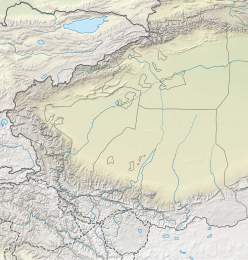塔格敦巴什帕米尔
(重定向自塔克敦巴什帕米尔)
塔格敦巴什帕米尔、塔克敦巴什帕米尔或历史上的塔德八士[1],现在的塔什库尔干河谷[2]是帕米尔高原河谷[3],位于中国新疆塔什库尔干塔吉克自治县西南部,在喀喇昆仑公路以西。居住着瓦罕族、柯尔克孜族和萨雷阔勒族牧民,他们在帕米尔草原上放牧牦牛其他动物[4]。
| 塔格敦巴什帕米尔 | |
|---|---|
 | |
| 别名 | 塔克敦巴什帕米尔 塔什库尔干河谷 |
| 地理 | |
| 位置 | 中国 新疆 塔什库尔干塔吉克自治县 |
| 人口中心 | 塔什库尔干镇 & 达布达尔乡 |
| 坐标 | 37°12′N 75°24′E / 37.200°N 75.400°E |
| 道路 | 喀喇昆仑公路 |
塔格敦巴什帕米尔这个名字有时也用于帕米尔周围的山脉,在巴基斯坦、阿富汗和塔吉克斯坦 与中国的边界上,横跨帕米尔高原沿着萨雷阔勒岭、兴都库什山脉、慕士塔格峰和瓦罕。该山脉将阿富汗的巴达赫尚省、塔吉克斯坦的山地巴达赫尚自治州和巴基斯坦的吉尔吉特-巴尔蒂斯坦 分隔开。
在清朝期间,中国人声称对该地区拥有宗主权,但允许坎巨提的罕萨米尔管理该地区作为对中国朝贡回报[5] 。据英国殖民地消息来源称,这种安排始于早期阿约什王朝(Ayosh)的罕萨米尔,随着罕萨米尔统治者征服了塔格敦巴什帕米尔的柯尔克孜游牧民族[6]。罕萨米尔统治者在达布达尔乡竖立了一座石标以证明他的控制权。朝贡制度一直持续到1937年[4][5]。
1984年,帕米尔及周边地区被划为塔什库尔干野生动物自然保护区[2]。卡拉其古河谷 ,位于塔什库尔干河谷的分支是中国唯一可以找到马可波罗盘羊的地方[7]。
参考文献
编辑- ^ Ministry of Foreign Affairs (Taiwan). 外交部档案丛书: 界务类 [Ministry of Foreign Affairs Archives: Boundary Affairs]. 外交部. 2001: 54. ISBN 978-957-02-9381-4.
...塔德八士两地继续与喀什噶尔之中国当局保持礼物之交换 / Taghdumbash to continue maintain tribute exchange with Chinese authorities at Kashgar
- ^ 2.0 2.1 Taxkorgan Nature Reserve. icimod.org. 国际山地综合发展中心. [2017-02-05]. (原始内容存档于2016-08-12).
Basically flat and in places more than 5km wide, the Taxkorgan Valley (the Taghdumbash Pamir on old maps) was part of the ancient Silk Route
- ^ Stein, M. Aurel. Ancient Khotan: Detailed Report of Archaeological Explorations in Chinese Turkestan 1. Oxford, UK: 牛津大学出版社. 1907: 32.
That part of the valley which properly bears the designation of Taghdumbash Pamir may be said to extend from the Wakhjir Pass to a short distance above Dafdar
- ^ 4.0 4.1 Wiener, Gerald; Han, Jianlin; Long, Huijun. Yak keeping in Western High Asia: Tajikistan, Afghanistan, Southern Xinjiang Pakistan, by Hermann Kreutzmann. The Yak 2nd. Bangkok: FAO RAP. June 2003 [2023-01-28]. ISBN 9251049653. (原始内容存档于2019-02-17).
- ^ 5.0 5.1 Christopher Snedden. Understanding Kashmir and Kashmiris. Oxford University Press. 2015: 119. ISBN 978-1-84904-342-7.
For 200 years, the Mir of Hunza had paid tribute annually to officials of China's Qing/Manchu dynasty located in Kashgar. .. the Mir may have received tribute from a lesser ruler in the Taghdumbash Pamir north of Hunza. Although the Mir of Hunza eventually accepted Dogra suzerainty, the British only forced him to end his tributary relationship with China in 1937
- ^ Ayaz, Muhammad. Gazetteer of Gilgit. Simla Government of India Press 2nd (Simla: Government of India Press). 1927: 85 [2023-01-28]. (原始内容存档于2022-09-30).
In former days Salim Khan, son of Ayasho and ruler of Hunza, marched against the Kirghiz nomads of the Taghdumash Pamir, and in the battle that ensued utterly routed them. In celebration of his victory he erected a cairn of stones at Dafdar, and sent a trophy of Kirghiz heads as present to the Chinese, together with a message that Hunza territory extended as far as Dafdar. Although hitherto Humza had held no intercourse of any kind with the Chinese, the latter returned a present to Salim Khan for having conquered their enemies, and henceforward a custom of an annual interchange of presents between the Chinese and the people of Hunza has prevailed to this day. Hunza has also drawn a yearly tribute in the form of a grazing tax, from all, whether Kirghiz or Sarikuli, who graze in the Taghdumbash.
- ^ USFWS. Endangered and Threatened Wildlife and Plants; Proposed Threatened Status for Argali (PDF). Federal Register (USDOI). 1990-10-05 [2017-02-05]. (原始内容 (PDF)存档于2017-02-25).
consisting of fewer than 150 animals, was confined to the western part of the Chalachigu Valley, a finger of land extending between Afghanistan on the north and Pakistan to the south.
外部连结
编辑- Holdich, Thomas Hungerford. Pamirs. Encyclopædia Britannica 20 (第11版). London: 655–659. 1911.
| 这是一篇與新疆相關小作品。您可以通过编辑或修订扩充其内容。 |


